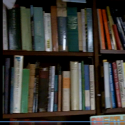A Lifetime of Reading Versus a Lifetime of Writing
 This past week I traveled to Florida to help clear out my dad's house. He recently fell and hit his head, and now he's in a rehabilitation center while his memory recovers. It may take him months to return to his normal self. When he does, we want him to live closer to my sister in Tampa.
This past week I traveled to Florida to help clear out my dad's house. He recently fell and hit his head, and now he's in a rehabilitation center while his memory recovers. It may take him months to return to his normal self. When he does, we want him to live closer to my sister in Tampa.
I spent an entire day clearing out his office. I boxed up about 15 boxes of books, which will be donated to Salvation Army. While sorting through his library, I found about five genres of books. They could roughly be classified into five piles: literary fiction, poetry, religion, dieting, and gardening. You can tell a lot about a person by looking at what he or she reads. I had no idea my dad's interest in religion was so pervasive. I boxed up about 14 different bibles. He's Russian Orthodox, so there was a lot of liturgical books, prayer books, and commentary about early Christian fathers, biblical commentaries, books on transformational christianity, and so on.
The other genres were not insignificant either. Poetry alone probably comprised three boxes -- Wallace Stevens, Byron Scott, William Wordsworth, William Carlos Williams, Alexander Pope, and many more well-known poets. In his living room, he dedicated an entire bookshelf for Anne Dillard's works.
Many books had bookmarks placed about 40 pages into the book, probably where he lost interest. Not every book is worth reading cover to cover.
While boxing, I set aside some books for myself, such as What the Dog Saw, a new book by Malcolm Gladwell, The Origin of Creativity (it looked interesting), John Muir's Longest Walk, and Things I Learned About My Father in Therapy, an anthology by Heather Armstrong.
Looking at all the books in the library, I am not sure that reading deserves so much praise. Certainly, much of what we write is a response to what we read, coupled with our experiences. We need some level of information to write. But if reading is merely absorbing information, soaking it up like a sponge, at some point, reading becomes passive. The reader must do something with the information: contemplate, act, experiment, reflect, respond, try, hypothesize, write, and so on. Reading is a catalyst for action (unless it's just a leisure activity, or something to do to fall asleep).
About six months ago, my father was up visiting me in Utah. During his stay, he was pouring through The Happiness Project, by Gretchin Ruben, and taking copious notes. Presumably, he was reading to discover ways to be happier. He wasn't just soaking it in. He was reading to act.
In his youth, my father was an English graduate student at the University of Washington, and he planned to move to Australia and write the great American novel. But then he realized, through reading, that the great American novel had already been written, time and again. The realization took away his motivation to write.
He's actually an excellent writer, so far as I can tell from his letters. My mother said he would often compose essays for his classes just once, with little or no edits, and get As. She was disappointed that he did not finish his PhD and become an English professor.
The market for English PhDs was just as bad in the 70s as it is today, so it's no wonder my father pursued a different route. Instead of going the PhD route, though, he made a terrible choice: He bought a tavern, and drank himself into alcoholism. Alcoholism sort of derailed his life. He later joined AA and became sober -- and has been for 30 years -- but he feels alcohol was the cause of so many of his life's problems. (Sponsor tip: Get more details on alcoholism treatment.)
While boxing up books, cleaning up notes and endless office papers, I kept wondering, why not write more? So what if the great American novel has already been written. Does that make it a vain, repetitive effort to write it again? Exactly how much time should you spend reading? Isn't there personal value in writing, even if the writing is redundant to other writings?
My personal approach is to read moderately. I wish I were a more voracious reader, but ultimately my real goal is to write a page, or post, since I'm a blogger. I keep stacking up my posts on findability, one after the other. When I hit 100, I figure I'll have explored the topic deeply enough to begin writing and organizing a book. All my research will be there, ready.
Reading is certainly a catalyst for thought. When I draw a blank for topics to write about, I just search twitter for #techcomm, and review the most interesting post I find. But I always want to move into the writing space, rather than just reading. When I write, it forces me to evaluate topics more rigorously. It requires me to think about what I think. It gives me space to explore, and allows me to dabble in the world of ideas.
I loaded about fifteen boxes of books into my dad's old yellow pickup and drove several miles to the nearest Salvation Army. Though I donated the books, I did save all papers -- journal entries, notes, binders, anything I could find that was a personal expression he had written. I guess books themselves, the ones you choose to keep and line your bookshelves with, are a personal expression that reflects your interests and life's passions. But somehow they didn't seem worth keeping.


